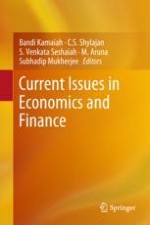2017 | OriginalPaper | Buchkapitel
Fiscal Deficit and Economic Growth Relationship in India: A Time Series Econometric Analysis
verfasst von : M. R. Anantha Ramu, K. Gayithri
Erschienen in: Current Issues in Economics and Finance
Verlag: Springer Singapore
Aktivieren Sie unsere intelligente Suche, um passende Fachinhalte oder Patente zu finden.
Wählen Sie Textabschnitte aus um mit Künstlicher Intelligenz passenden Patente zu finden. powered by
Markieren Sie Textabschnitte, um KI-gestützt weitere passende Inhalte zu finden. powered by
